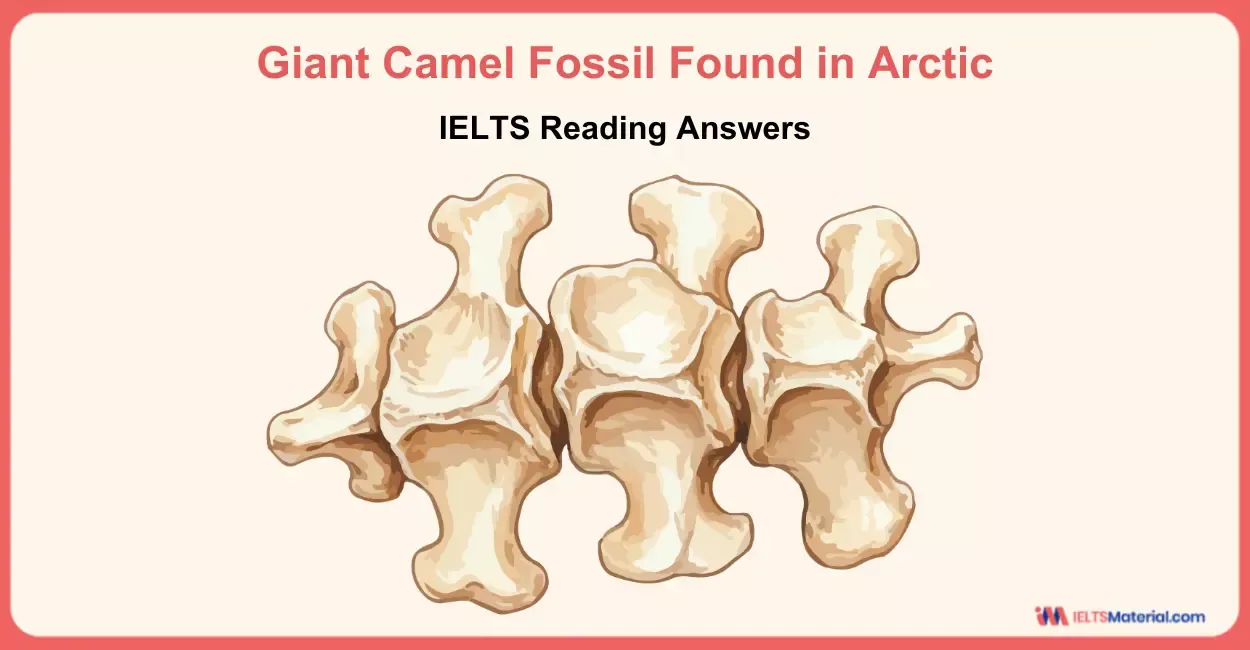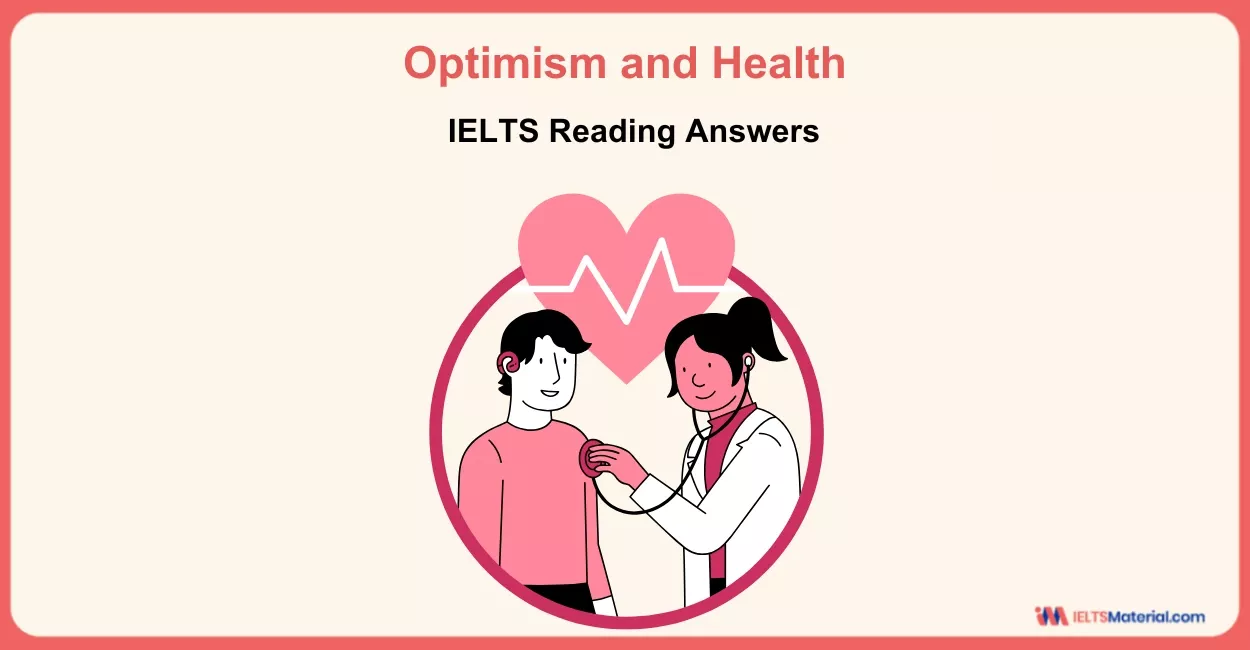Optimism and Health - IELTS Reading Answers
12 min read
Updated On
-
Copy link
Want to practice more IELTS Academic Reading passages? Attempt questions in the passage on 'Optimism and Health' and analyze the answers while learning about the checklist to follow while practising with the questions to get a desired band score of 8+.
Table of Contents

Limited-Time Offer : Access a FREE 10-Day IELTS Study Plan!
The Academic passage ‘Optimism and Health’ is a reading passage that appeared in an IELTS Test. Since questions get repeated in the IELTS exam, these passages are ideal for practice. Your keyword practice with this passage will increase not only your reading speed and comprehension but also your ability to tackle complex questions and locate information.
This IELTS Reading passage correlates to the extent to which positive thinking fosters a holistic well-being. This practice test will also extend your knowledge relating to health and psychology as well as critical reading skills like scanning and skimming. Let’s get started!
Connect with our band 9 IELTS Trainers to crack your IELTS Reading in no time! Book a FREE Demo.
Types of Questions in IELTS Reading Passage ‘Optimism and Health’
Understanding the question types is crucial since it will help you focus on specific strategies for a particular question. This is an essential step to get familiar with before diving into the passage. This will not only improve your performance but also elevate the depth of your analysis while making you focus more.
The question types found in this passage are:
- IELTS Reading Summary Completion (Q. 14-17)
- IELTS Reading Matching Endings (Q.18-22)
- IELTS Reading Yes, No, Not Given (Q.23-26)
Checklist to Follow for Practising with the IELTS Reading Passage ‘Optimism and Health’
Just attempting questions and practising with different passages might not help you achieve a band 8+ in the IELTS Academic Reading module. You must also learn certain techniques to use these passages to your advantage. In this way, you will improve your reading speed, accuracy, and comprehension skills. The table below shows the checklist to follow in order to practice with the passage, ‘Optimism and Health’.
|
Step |
Task |
Strategy |
|
1 |
Skim the passage once (2–3 minutes) |
Give you a general idea and main themes without wasting much time. |
|
2 |
Highlight keywords in the questions |
Helps you immediately to spot the same words or synonyms in the passage. |
|
3 |
Scan the passage to find related information |
Develops your speed in pinpointing locations in the text where the answers are most likely to be found. |
|
4 |
Pay attention to qualifiers (always, may, some, rarely, never, etc.) |
Avoid mistakes which might confuse you. |
|
5 |
Match information logically, not just word-for-word |
Fosters the ability to recognize paraphrasing and avoid any miscommunication. |
|
6 |
Put the timer on and finish answering within 20 minutes |
Helps you practice the time management that is necessary in the real exam. |
|
7 |
Analyze incorrect answers with explanations |
Discover constructive reasoning so that you do not make the same mistakes again. |
|
8 |
Jot down new vocabulary with meanings and example sentences |
Improves your academic vocabulary related to Reading, Writing, and Speaking. |
Curious to learn how to improve your reading skills to get a band 9? Check out the video below!
IELTS Reading Passage on ‘Optimism and Health’
You should spend about 20 minutes on Questions 27-40, which are based on the Reading Passage below.
Optimism and Health
Mindset is all. How you start the year will set the template for the rest, and two scientifically-backed character traits hold the key: optimism and resili-ence (if the prospect leaves you feeling pessimistically spineless, the good news is that you can significantly boost both of these qualities).
A Faced with 12 months of plummeting economics and rising human distress, staunchly maintaining a rosy view might seem deludedly Pollyannaish. But here we encounter the optimism paradox. As Brice Pitt, an emeritus professor of the psychiatry of old age at Imperial College, London, told me: "Optimists are unrealistic. Depressive people see things as they really are, but that is a disadvantage from an evolutionary point of view. Optimism is a piece of evolu-tionary equipment that carried us through millennia of setbacks."
B Optimists have plenty to be happy about. In other words, if you can convince yourself that things will get better, the odds of it happening will improve - be-cause you keep on playing the game. In this light, optimism "is a habitual way of explaining your setbacks to yourself", reports Martin Seligman, the psychology professor and author of Learned Optimism. The research shows that when times get tough, optimists do better than pessimists - they succeed better at work, respond better to stress, suffer fewer depressive episodes, and achieve more personal goals.
C Studies also show that belief can help with the financial pinch. Chad Wallens, a social forecaster at the Henley Centre who surveyed middle-class Britons' beliefs about income, has found that "the people who feel wealthiest, and those who feel poorest, actually have almost the same amount of money at their disposal. Their attitudes and behaviour patterns, however, are different from one another."
D Optimists have something else to be cheerful about - in general, they are more robust. For example, a study of 660 volunteers by the Yale University psychologist Dr Becca Levy found that thinking positively adds an average of seven years to your life. Other American research claims to have identified a physical mechanism behind this. A Harvard Medical School study of 670 men found that the optimists have significantly better lung function. The lead author, Dr Rosalind Wright, believes that attitude somehow strengthens the immune system. "Preliminary studies on heart patients suggest that, by changing a per-son's outlook, you can improve their mortality risk," she says.
E Few studies have tried to ascertain the proportion of optimists in the world. But a 1995 nationwide survey conducted by the American magazine Adweek found that about half the population counted themselves as optimists, with women slightly more apt than men (53 per cent versus 48 per cent) to see the sunny side.
F Of course, there is no guarantee that optimism will insulate you from the crunch's worst effects, but the best strategy is still to keep smiling and thank your lucky stars. Because (as every good sports coach knows) adversity is char-acter-forming so long as you practise the skills of resilience. Research among tycoons and business leaders shows that the path to success is often littered with failure: a record of sackings, bankruptcies and blistering castigation. But instead of curling into a foetal ball beneath the coffee table, they resiliently pick themselves up, learn from their pratfalls and march boldly towards the next opportunity.
G The American Psychological Association defines resilience as the ability to adapt in the face of adversity, trauma or tragedy. A resilient person may go through difficulty and uncertainty, but he or she will doggedly bounce back.
H Optimism is one of the central traits required in building resilience, say Yale University investigators in the. Annual Review of Clinical Psychology. They add that resilient people learn to hold on to their sense of humour and this can help them to keep a flexible attitude when big changes of plan are warranted. The ability to accept your lot with equanimity also plays an important role, the study adds.
I One of the best ways to acquire resilience is through experiencing a difficult childhood, the sociologist Steven Stack reports in the Journal of Social Psych-ology. For example, short men are less likely to commit suicide than tall guys, he says, because shorties develop psychological defence skills to handle the bullies and mickey-taking that their lack of stature attracts. By contrast, those who enjoyed adversity-free youths can get derailed by setbacks later on because they've never been inoculated against aggro.
J If you are handicapped by having had a happy childhood, then practising proactive optimism can help you to become more resilient. Studies of resilient people show that they take more risks; 'they court failure and learn not to fear it.
K And despite being thick-skinned, resilient types are also more open than aver-age to other people. Bouncing through knock-backs is all part of the process.
L It's about optimistic risk-taking - being confident that people will like you. Simply smiling and being warm to people can help. It's an altruistic path to self-interest - and if it achieves nothing else, it will reinforce an age-old adage: hard times can bring out the best in you.
Questions 14-17
Complete the summary below using NO MORE THAN THREE WORDS from Reading Passage for each answer.
A study group from Yale University had discovered that optimism can stretch one's life length by 14 ________________ years. And another group from Harvard thinks they have found the biological because an basis - optimists have better 15 ________________ optimist outlook boosts one's 16 ________________. The study on 17 ________________ was cited as evidence in support of this claim.
Questions 18-22
Complete each sentence with the correct ending A-H.
18 Brice Pitt believes
19 The research at Henley Centre discovers
20 The study conducted by Adweek finds
21 The Annual Review of Clinical Psychology reports 22. Steven Stack says in his report
|
Questions 23-26
Do the following statements agree with the claims of the writer in Reading Passage? In boxes 23-26 on your answer sheet write
YES - if the statement agrees with the information
NO if the statement contradicts the information
NOT GIVEN - if there is no information on this
23 The benefits of optimism on health have been long known.
24 Optimists have better relationships with people than pessimists.
25 People with happy childhoods won't be able to practise optimism.
26 Resilient people are often open, and even thick skinned.
Grab the IELTS Reading (Academic) Test Guide: Essential Tips, Strategies, and Practice Tests” (April-June 2025) today!
Answers with Location and Explanation on Passage ‘Optimism and Health’
Let's now look at the answers and their locations as well as explanations for the IELTS passage on 'Optimism and Health'. This will help you identify weak areas that need to be worked upon before tackling similar passages or the same question types. Doing this over and again will improve your skill level, enhancing your chances of receiving a better IELTS Band Score.
Unlock Answers
The answers with explanations are given below :
|
Answer |
Question Type |
Answer Location |
Answer Explanation |
|
14. 7/seven |
Summary Completion |
Paragraph D |
Paragraph D reveals that a ‘study of 660 volunteers’ (group study) by the ‘Yale University’ psychologist Dr. Becca Levy found that ‘thinking positively’ (optimism) ‘adds’ (can stretch) an average of ‘seven years to your life’. Hence, the answer is ‘7/seven’. |
|
15. lung function |
Summary Completion |
Paragraph D |
Paragraph D points out that ‘a Harvard Medical School study’ of 670 men found that the ‘optimists have significantly better lung function’. Hence, the answer is ‘lung function’. |
|
16. immune system |
Summary Completion |
Paragraph D |
Paragraph D states that ‘a Harvard Medical School study’ of 670 men ‘found that the optimists have significantly better lung function’. The lead author, Dr. Rosalind Wright, believes that ‘attitude’ (optimistic outlook) somehow ‘strengthens’ (boosts) the immune system. Hence, the answer is ‘immune system’. |
|
17. heart patients |
Summary Completion |
Paragraph D |
Paragraph D informs that Dr. Rosalind Wright, believes that ‘attitude’ (optimistic outlook) somehow ‘strengthens the immune system’. She adds that preliminary ‘studies on heart patients’ ‘suggest’ (support) that, by ‘changing a person’s outlook, you can improve their mortality risks’ (the claim of the study). Hence, the answer is ‘heart patients’. |
|
18. C |
Matching Sentence Endings |
Paragraph A |
Paragraph A declares that ‘Brice Pitt’, an emeritus professor of the psychiatry of old age at Imperial College, London, told the author that depressive people see things as they really are, but that is a disadvantage from an evolutionary point of view. ‘Optimism’ is a ‘piece of evolutionary equipment that carried us through millennia of setbacks’ (advantageous for human evolution as it helps to overcome various obstacles). Hence, the answer is C (optimism is advantageous for human evolution). |
|
19. A |
Matching Sentence Endings |
Paragraph C |
Paragraph C let out the fact that Chad Wallens, a social forecaster at the ‘Henley Centre’ who surveyed middle-class Britons’ beliefs about income, has found that “the people who feel wealthiest, and those who feel poorest, actually have almost the same amount of money at their disposal. Their attitudes and behaviour patterns, however, are different from one another.” From this statement, we can conclude that money or material wealth may not bring happiness or a positive outlook. Happiness actually depends on the attitude of a person whether he/she wants to be satisfied with whatever he/she has. Hence, the answer is A (material wealth doesn’t necessarily create happiness). |
|
20. E |
Matching Sentence Endings |
Paragraph 3 |
Paragraph E relates that a 1995 nationwide ‘survey’ (study) ‘conducted by the American magazine Adweek found’ that about half the population counted themselves as optimists, with ‘women slightly more apt than men (53 per cent versus 48 per cent) to see the sunny side’. This means that women are more optimistic than men and thus, levels of optimism vary according to gender. Hence, the answer is E (feelings of optimism vary according to gender). |
|
21. G |
Matching Sentence Endings |
Paragraph H |
Paragraph H mentions that ‘optimism’ is one of the ‘central traits required in building resilience’, say Yale University investigators in the ‘Annual Review of Clinical Psychology’. They add that resilient people learn to hold on to their sense of humour and this can help them to keep a ‘flexible attitude when big changes of plan are warranted’, which means that even under stressful situations they are able to maintain their positivity (evenness of mind). Hence, the answer is G (evenness of mind under stress is important to building resilience). |
|
22. D |
Matching Sentence Endings |
Paragraph I |
Paragraph I brings out the fact that ‘one of the best ways to acquire resilience’ (way in which resilience can be created or bred) is through experiencing a ‘difficult childhood’ (adversity), the sociologist Steven Stack reports in the Journal of Social Psychology. It is supported through an example that short men are less likely to commit suicide than tall guys, he says, because shorties develop psychological defence skills to handle the bullies and mickey-taking that their lack of stature attracts. Hence, the answer is D (adversity is the breeding ground of resilience). |
|
23. Not Given |
Yes/No/Not Given |
Paragraph D |
Paragraph D refers to benefits of optimism on health through a study by the Yale University psychologist Dr. Becca Levy where it is found that thinking positively adds an average of seven years to your life. Moreover, a Harvard Medical School study found that the optimists have significantly better lung function. The lead author, Dr. Rosalind Wright, believes that attitude somehow strengthens the immune system. Other than these mentions, the author of the passage did not mention if the health benefits have been long known. So, the answer is ‘NOT GIVEN’. |
|
24. Not Given |
Yes/No/Not Given |
Paragraph B |
In paragraph B, the author refers to the fact that the research by Martin Seligman, the psychology professor and author of Learned Optimism, shows that when times get tough, ‘optimists do better than pessimists’ – they succeed better at work, respond better to stress, suffer fewer depressive episodes, and achieve more personal goals. But there is no mention of any comparison between the two in case of relationships. Hence, the answer is ‘NOT GIVEN’. |
|
25. No |
Yes/No/Not Given |
Paragraph J |
Paragraph J comments that if you had a ‘happy childhood’, then ‘practising proactive optimism’ can ‘help you to become more resilient’. So, it means that even if you have a happy childhood, you can become resilient by practising optimism. As the statement contradicts the information, the answer is ‘NO’. |
|
26. Yes |
Yes/No/Not Given |
Paragraph K |
In paragraph K, it is conveyed that ‘despite being thick-skinned, resilient types are also more open’ than average to other people. So, the statement agrees with the information and the answer is ‘YES’. |
Enroll into our Free IELTS Webinar and learn more about techniques to improve your reading speed.
Use passages such as 'Optimism and Health' to practice and hone your reading skills as you prepare yourself to achieve a higher band score of 8+. This would help you continue strengthening your comprehension skills, managing time effectively, and improve your reading accuracy. As you dive into the answers with explanations, you can start with a steady progress of building confidence, making you exam-ready.
Check More IELTS Reading Answers
Also Check:
- IELTS Reading Tips And Techniques To Increase Your Reading Speed
- IELTS Reading Practice Tests – Free Sample Tests
- IELTS Reading Recent Actual Tests 2025
- IELTS Books to Use During IELTS Preparation in 2025
- IELTS Reading: Previous Year Actual Tests with Answers PDF 2025
Practice IELTS Reading based on question types

Start Preparing for IELTS: Get Your 10-Day Study Plan Today!
Explore other Reading Practice Tests

Kasturika Samanta

Kasturika Samanta

Nehasri Ravishenbagam
Recent Articles

Nehasri Ravishenbagam

Haniya Yashfeen

Haniya Yashfeen

Haniya Yashfeen





Post your Comments